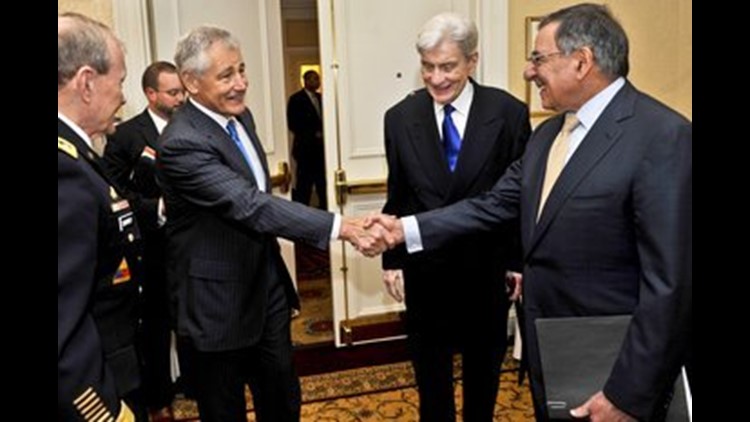(CNN) — Badly burned after his armored personnel carrier hit a land mine in Vietnam, Chuck Hagel sat in a medical evacuation helicopter thinking of the horrors he had experienced during combat.
“If I ever get out, if I ever can influence anything, I will do all I can to prevent war,” he would later tell his biographer, Charlyne Berens.
It was a seminal moment for the young soldier turned Nebraska senator who sources now say will be nominated by President Barack Obama to become the next secretary of defense.
Should he be nominated to replace current Defense Secretary Leon Panetta, Hagel would bring to the Pentagon a distinct bias against armed conflict forged during the Vietnam War.
Hegal volunteered to join the Army and ended up serving a yearlong tour in 1968 during the Tet Offensive, considered the most violent period in that war. Because of a clerical error, he served side by side with his younger brother.
He earned two Purple Hearts, one of which was for saving his brother’s life. The second Purple Heart was for shrapnel he took in the chest while on patrol with his brother; his brother saved his life by patching up the wound.
After coming home, Hagel worked briefly as a newscaster, then had a career in business, before entering public service as a Republican senator from Nebraska. He served in that role from 1997 to 2009.
Hagel’s time in Vietnam forged his thoughts about combat for the rest of his life, earning him a reputation on Capitol Hill as someone with an independent streak that meant he was sometimes at odds with his Republican colleagues.
“Not that I’m a pacifist — I’m a hard-edged realist, I understand the world as it is — but war is a terrible thing. There’s no glory, only suffering,” he is quoted as saying in his 2006 biography, “Chuck Hagel: Moving Forward.”
Hagel opposed the troop surge in Iraq, as did Obama, calling it, “the most dangerous foreign policy blunder in this country since Vietnam.” He similarly opposed Obama’s surge in Afghanistan and called for deep cuts in defense spending.
Those and other positions did not sit well with Hagel’s Republican colleagues, and they hurt his chances to move up the ranks to power positions.
Most recently, Hagel has taught at Georgetown University while serving as co-chairman of the President’s Intelligence Advisory Board.
While serving in the Senate, Hagel became close with then-Sen. Obama, and they seemed to find common ground on the use of military force and on Hagel’s fairly moderate approach to foreign relations issues. Obama also appreciated Hagel’s willingness to buck his own party.
Hagel, Obama and Sen. Jack Reed toured parts of the Middle East, including Iraq, in 2008.
“It was an extraordinary trip,” Reed, a Rhode Island Democrat, told CNN’s Security Clearance. “There was just an exchange of ideas about the region, and I think the president was also impressed with not only (Hagel’s) understanding but the questions he raised, not just with the president but with the foreign leaders that we met.”
Hagel and Obama also have common ground when it comes to Iran. Both believe in open dialogue with Iran, though Hagel has argued against sanctions, while the president has tightened the screws on Iran with tougher sanctions.
“By refusing to engage Iran, we are perpetuating dangerous geo-political unpredictabilities,” Hagel said in a 2007 speech. “Our refusal to recognize Iran’s influence does not decrease its influence but rather increases it. Engagement creates dialogue and opportunities to identify common interests, demonstrate America’s strengths, as well as make clear disagreements,” he said.
In September, Hagel co-authored an opinion piece in the Washington Post backing the idea of “keeping all options on the table” for stopping Iran’s suspected nuclear program.
“Since the consequences of a military attack are so significant for U.S. interests, we seek to ensure that the spectrum of objectives, as well as potential consequences, is understood,” it read. The piece did not rule out the possibility of using military force.
For Hagel, getting to the Pentagon would mean overcoming vocal opposition from pro-Israel groups and others who object to his stance on Iran and Hamas. Hagel has opposed efforts to isolate militant groups such as Hamas.
He has also faced opposition from gay-rights groups, strong supporters of Obama’s election campaign, for a comment Hagel made in 1998 in which he questioned whether a nominee for an ambassadorship was suitable because he was “openly, aggressively gay.” He apologized for that remark in December.
If nominated and confirmed, Hagel would be handed the challenge of closing the final chapter on the U.S.-led war in Afghanistan and overseeing the continued footprint of a smaller U.S. training force there.
Hagel has been critical of U.S. policy in Afghanistan. In 2009 he opposed Obama’s 30,000-troop surge, telling the National Journal, “I’m not sure we know what the hell we are doing in Afghanistan.”
“It’s not sustainable at all; I think we’re marking time as we slaughter more young people,” he said. Later he called for the United States to stop its “nation-building” there.
He would also have to tackle the Pentagon’s budget. Hagel has said in the past that be believes the Pentagon’s budget is too big.
“The Defense Department, I think in many ways, has been bloated,” Hagel said in a September 2011 interview with the Financial Times. “So I think the Pentagon needs to be pared down.”
™ & © 2013 Cable News Network, Inc., a Time Warner Company. All rights reserved.



